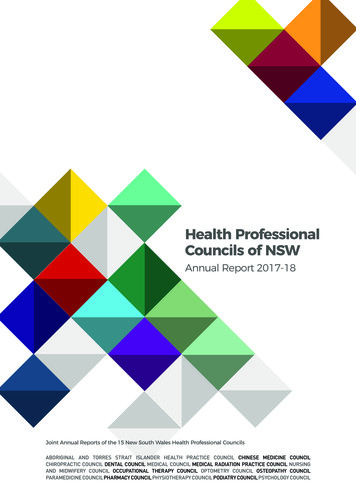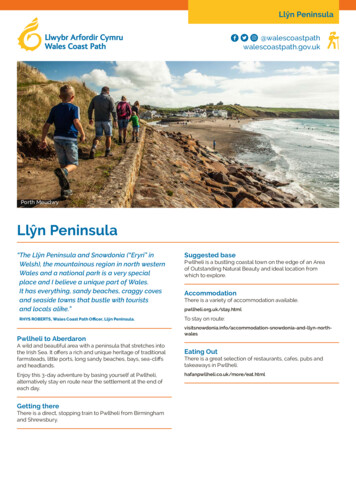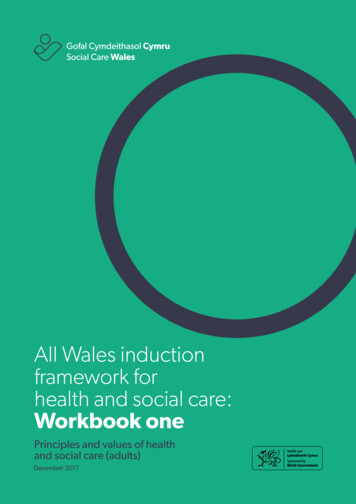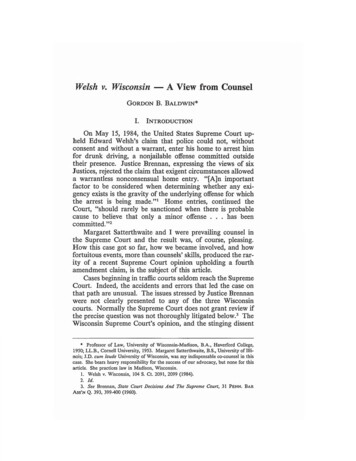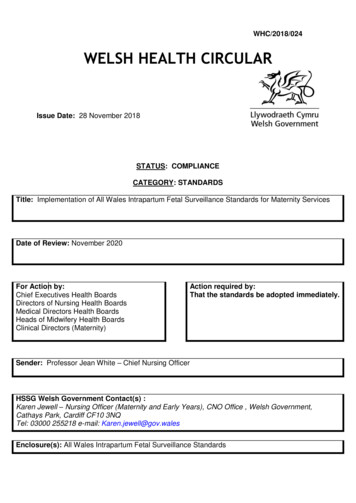
Transcription
WHC/2018/024WELSH HEALTH CIRCULARIssue Date: 28 November 2018STATUS: COMPLIANCECATEGORY: STANDARDSTitle: Implementation of All Wales Intrapartum Fetal Surveillance Standards for Maternity ServicesDate of Review: November 2020For Action by:Chief Executives Health BoardsDirectors of Nursing Health BoardsMedical Directors Health BoardsHeads of Midwifery Health BoardsClinical Directors (Maternity)Action required by:That the standards be adopted immediately.Sender: Professor Jean White – Chief Nursing OfficerHSSG Welsh Government Contact(s) :Karen Jewell – Nursing Officer (Maternity and Early Years), CNO Office , Welsh Government,Cathays Park, Cardiff CF10 3NQTel: 03000 255218 e-mail: Karen.jewell@gov.walesEnclosure(s): All Wales Intrapartum Fetal Surveillance Standards
Dear ColleaguesI am writing to you to set out the new intrapartum fetal surveillance standardsthat have been developed by clinicians in Wales. I ask that you ensure thatthese standards are adopted across maternity services for women receivingintrapartum care effective immediately.BackgroundIn response to concerns raised by the midwifery and obstetric communityacross Wales, the Wales Maternity Network held a multi-professional meetingin October 2016, to consider best practice for intrapartum fetal surveillance,including cardiotocography training (CTG).The recommendation from the All Wales Expert Reference Group was that thecurrent position in relation to the Royal College of Midwives and the RoyalCollege of Obstetricians and Gynaecologists (RCM/RCOG) online electronicpackage no longer satisfied the training requirements for midwives andobstetricians within Wales.With recognition of the importance of fetal wellbeing assessment and practicestandards, the Chief Nursing Officer requested that the Maternity Networklead work to produce Welsh standards for fetal surveillance practices andtraining. The Wales Maternity Network, together with the All Wales ExpertReference Group, held a meeting in May 2018, with representation from allHealth Boards within Wales to develop a consensus view of the future of CTGtraining within the context of intrapartum fetal surveillance. The All WalesIntrapartum Fetal Surveillance Standards represent the consensus positionreached.EngagementThere has been wide engagement including Heads of Midwifery, the Women’sHealth National Specialist Advisory Group (NSAG), Welsh Risk Pool, RoyalCollege of Midwives and Royal College of Obstetricians and Gynaecologists.
Monitoring and Evaluation of standardsHealth Boards will be expected to fully implement standards and reportcompliance at annual maternity performance boards providing assurance toWelsh Government, beginning in 2019.I would like to thank the Maternity Network and those involved in thedevelopment of these standards.Yours sincerelyProfessor Jean White CBEChief Nursing OfficerNurse Director NHS Wales
WALES MATERNITY NETWORKAll Wales IntrapartumFetal Surveillance StandardsLead Authors:Wales Maternity Network Clinical Lead: Dr Claire FrancisWales Maternity Network Manager: Claire DaviesVersion: 1.0Co-authors:Wales Maternity Network: All Wales Expert Reference GroupReview date:September 2020Published:September 2018
Introduction .IntroductionIn response to concerns raised by the Midwifery and Obstetriccommunity across Wales, the Wales Maternity Network held amulti-professional meeting in October 2016, to consider best practicefor intra-partum fetal surveillance, including cardiotocographytraining (CTG).The recommendation from the All Wales Expert Reference Groupwas that the current position in relation to the Royal College ofMidwives and the Royal College of Obstetricians and Gynaecologists(RCM/RCOG) online electronic package, no longer satisfied thetraining requirements for Midwives and Obstetricians within Wales.The introduction of multi-professional training during 2018 for therecognition and response to obstetric emergencies, has beensupported by the Wales Maternity Network and funded by the WelshRisk Pool. This training incorporates and complements CTG learningby all grades of clinical staff.Professor Jean WhiteCHIEF NURSING OFFICERThe Wales Maternity Network together with the All Wales ExpertReference Group held a further meeting in May 2018, withrepresentation from all Health Boards within Wales to develop aconsensus view of the future of CTG training, with the context ofintrapartum fetal surveillance.The following standards represent the consensus:2 \ Wales Maternity NetworkFOR WALES
Intrapartum Fetal Surveillance Standards for Wales1All low risk women should be recommended intermittent auscultation (1)2Cardiotocography interpretation throughout Wales is to be based on the Federation ofInternational Gynaecology and Obstetrics classification system (FIGO) (2)3Training in intermittent auscultation, CTG or STAN, (where used), should be equitable for allmidwives and clinicians practicing within Wales.4All professionals providing intrapartum care will attend an annual whole day (or equivalent to 6hours) teaching seminar on fetal physiology in labour, discussion of the principles underlyingintermittent auscultation, CTG interpretation (and STAN) together with an understanding of thematernal and fetal risk factors.This will include maternal and co-morbidities, pyrexia, infection, fetal growth restriction,prematurity and the significance of meconium. This seminar should allow for discussion of clinicalcases.5All obstetric units must provide a weekly clinical meeting for the multi-professional discussion ofclinical cases involving CTG (or STAN) interpretation.All women requiring continuous electronic fetal monitoring must undergo a regular assessmentwith additional fresh eyes and clear documentation of findings. This review will be performed bythe midwife responsible for care and fresh eyes undertaken by another midwife or obstetrician(ST3 or above) within a maximum period of two hours. The assessment of maternal and fetal riskfactors must include documentation on:6Maternal:Fetal:Decision:Review:7Contractions, Maternal Pulse, Cervical Dilatation, Reason for CTGLiquor Colour (if known), Gestation, CTG Baseline, Variability, Accelerations,Decelerations (as per FIGO)Date and Time of Fresh Eyes, Signature, and Status of Assessor, Classification ofCTG and Action TakenDate and Time of Fresh Eyes, Signature and Status of Assessor and if agreementswith Review and ActionWhenever possible intrapartum fetal surveillance training must be multi-professional. It must bedelivered within a culture of respect and awareness of undermining behaviours and promote apositive and supportive atmosphere within the maternity setting. It should also encourage theprinciples of assertive communication and include a discussion about escalation and the use ofmulti-professional discussions, including safety huddles and a fresh eyes approach (3)3 \ Wales Maternity Network
FIGO CTG Classification2015 revised FIGO guidelines on intrapartum fetal monitoring.NormalBaseline110 - 160 bpmSuspiciousDecelerationsNo repetitive*decelerationsLacking at leastone characteristicof normality,but with nopathologicalfeatures.InterpretationNo hypoxia /acidosisLow probability ofhypoxia / acidosisVariabilityClinicalManagement5 - 25 bpmPathological 100 bpmReduce variability. Increasedvariability. Sinusoidal pattern.Repetitive* late or prolongeddecelerations for 30 min(or 20 min if reduced variability).Deceleration 5 min.High probability of hypoxia / acidosisAction to correct Immediate action to correct reversibleNo interventionreversible causes, if causes, adjunctive methods, or if this isnecessary toidentified, closenot possible, expedite delivery. Inimprove fetalmonitoring or adacute situations immediate deliveryoxygenation statejunctive methods.should be accomplished.* Decelerations are repetitive when associated with 50% contractions. Absence of accelerations inlabour is of uncertain significance.4 \ Wales Maternity Network
PROMPT Wales: CTG Sticker - example5 \ Wales Maternity Network
FIGOCTG ClassificationPROMPTWales: Interpretation CTG Classification
References1.Royal College of Midwives (2012) Evidence Based Guidelines for Midwifery – Led Care inLabour, Intermittent Auscultation2.FIGO Consensus Guidelines on Intrapartum Fetal Monitoring; Cardiotocography. Int J GynecolObstet 2015; 131:13-24. Ayres-de-Campos D, Spong CY, Chandraharan E, for the FIGO Intrapartum Fetal Monitoring Expert Consensus Panel3.Each Baby Counts 2015 Update June 20174.MBRRACE-UK Saving Lives, Improving Mothers’ Care – Lessons Learning to inform maternitycare from the UK and Ireland Confidential Enquires into Maternal Deaths and Morbidity2013-2015 December 2017AcknowledgementsThe Wales Maternity Network would like to thank the All Wales Expert Reference Group and theWelsh Risk Pool for their valuable input with the creation of the document.7 \ Wales Maternity Network
across Wales, the Wales Maternity Network held a multi-professional meeting in October 2016, to consider best practice for intrapartum fetal surveillance, including cardiotocography training (CTG). The recommendation from the All Wales Expert Reference Group was that the current position in relation to the Royal College of Midwives and the Royal




